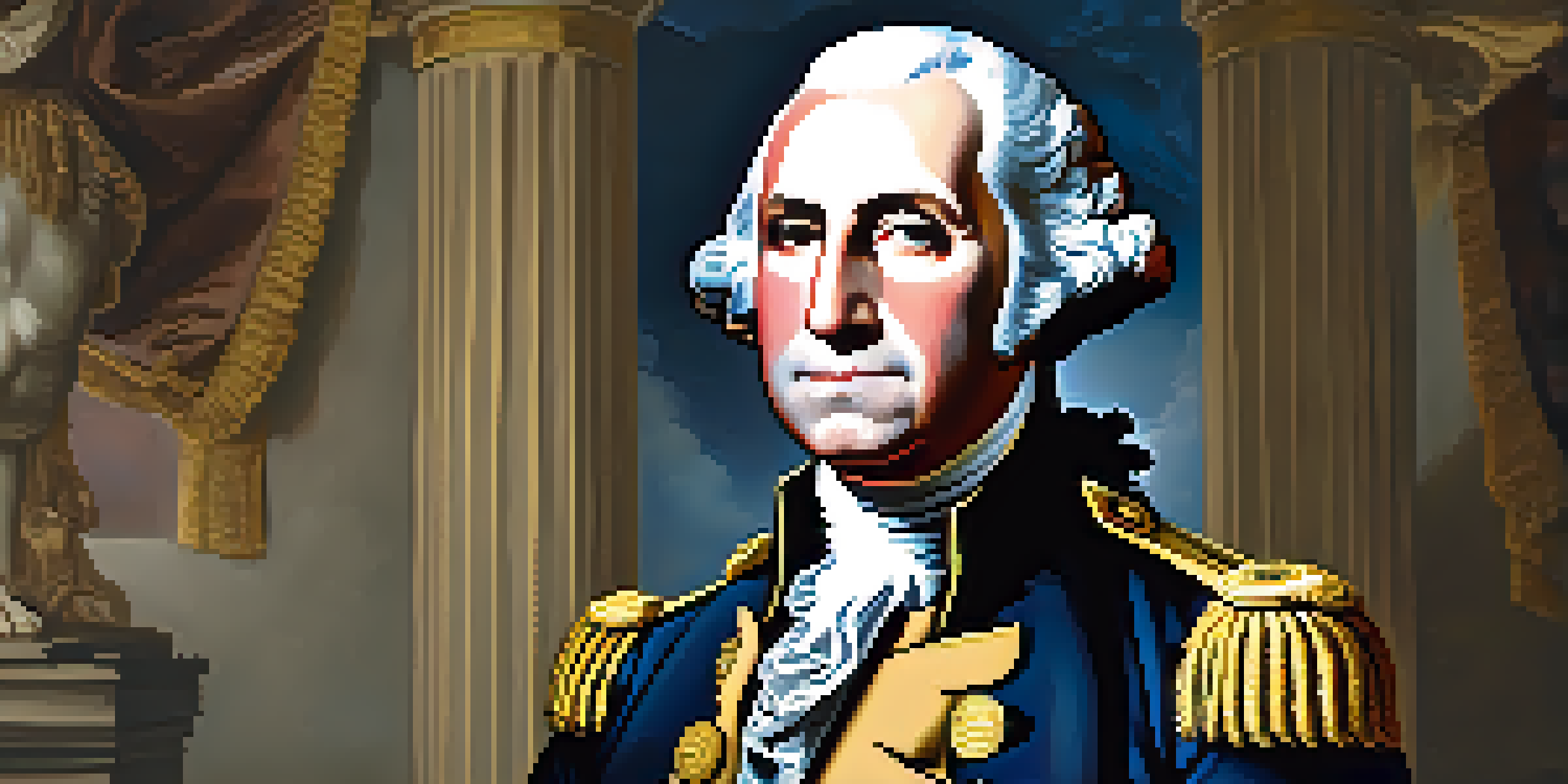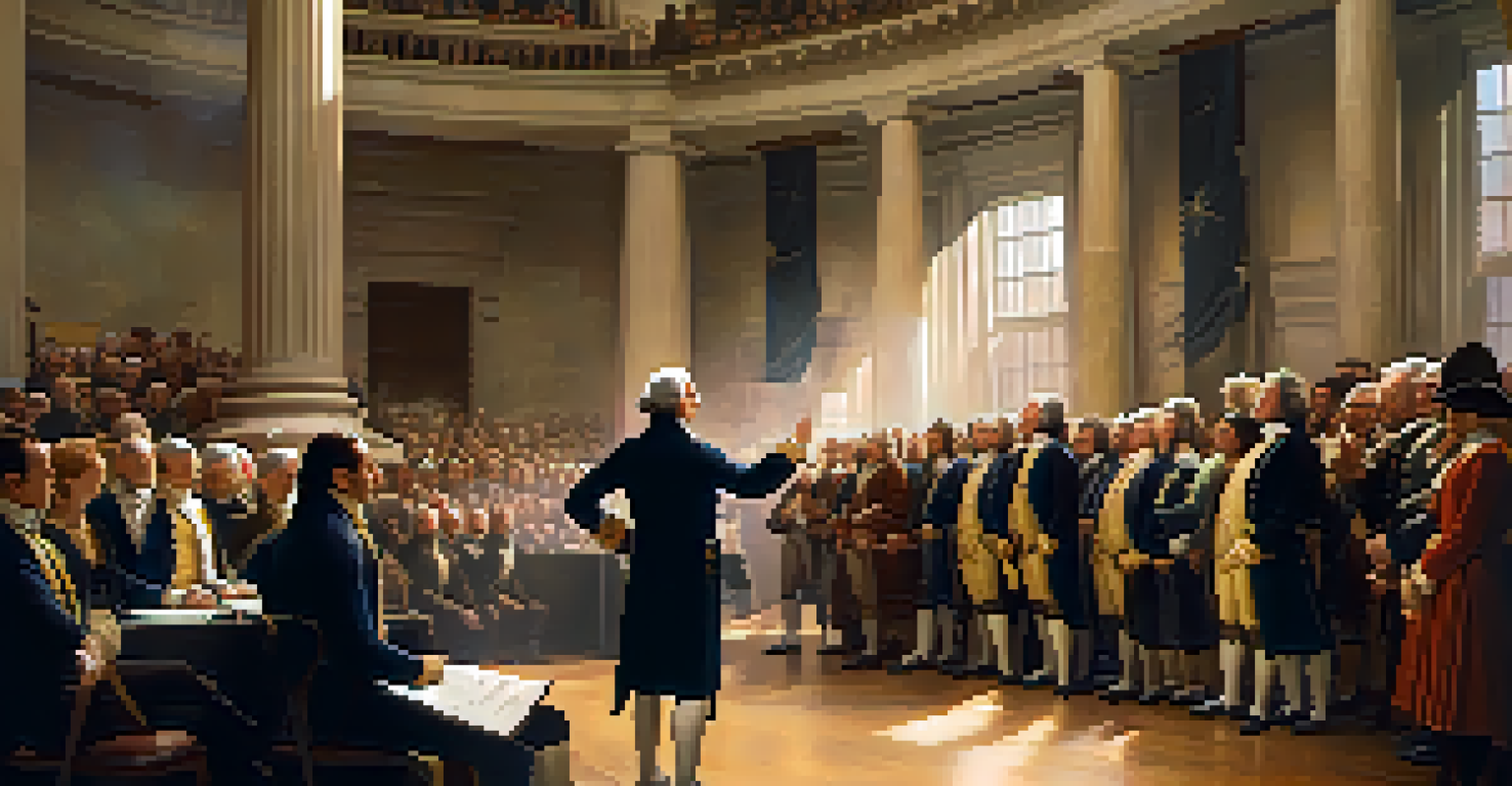George Washington: Founding Father and NYC's First Leader

The Early Life of George Washington in Colonial America
George Washington was born in 1732 in Westmoreland County, Virginia. Growing up in a colonial society, he learned the values of hard work and leadership from a young age. His early experiences, including surveying the lands of Virginia, helped shape his understanding of the American landscape and its potential.
It is better to offer no excuse than a bad one.
Washington's family background provided him with some advantages, but he also faced challenges, such as the loss of his father at a young age. This early loss instilled a sense of responsibility in him, driving him to pursue a life of service and leadership. His diverse interests, including military strategy and agriculture, laid a solid foundation for his future endeavors.
As the colonies faced increasing tensions with Britain, Washington's upbringing in Virginia's plantation society made him acutely aware of the need for strong leadership. His experiences and growing reputation would set the stage for his later role in the American Revolution and the founding of the nation.
Washington's Role in the American Revolution
Washington's military career began when he joined the Virginia militia, where he quickly gained experience and respect. His leadership skills were tested during the French and Indian War, but it was the American Revolution that truly defined him as a commander. Appointed Commander-in-Chief of the Continental Army in 1775, he faced immense challenges, including a lack of resources and training.

Despite these hurdles, Washington's strategic mind and ability to inspire his troops became legendary. Notable victories, such as the surprise attack at Trenton, showcased his tactical brilliance. His resilience during tough times, particularly the harsh winter at Valley Forge, solidified his reputation as a leader who could endure and motivate others.
Washington's Leadership Defined America
George Washington's military and political leadership during the American Revolution and as the first President set foundational precedents for the new nation.
Washington's leadership during the Revolution was pivotal not just for military success but for uniting the colonies. His ability to forge alliances and rally support from various factions helped turn the tide against British forces, ultimately leading to American independence. This success laid the groundwork for his later role in shaping the new nation.
The Formation of the United States and Washington's Presidency
After the Revolution, Washington's leadership was crucial in the formation of the United States. He presided over the Constitutional Convention in 1787, guiding the debates that would result in the U.S. Constitution. His commitment to creating a strong yet balanced government reflected his understanding of the delicate nature of democracy.
The future states of America are in our own hands.
In 1789, Washington became the first President of the United States, a role he approached with a sense of duty and responsibility. He set numerous precedents, including the formation of a Cabinet and the concept of a two-term limit. His leadership style emphasized the importance of unity and careful governance.
Washington's presidency was marked by significant challenges, such as foreign relations and domestic unrest. However, his approach to leadership—grounded in the principles of integrity and service—helped establish the foundation of the executive branch and strengthen the fledgling nation.
Washington's Connection to New York City
New York City played a pivotal role in Washington's life and the early United States. After the Revolution, it served as the nation's capital from 1785 to 1790, making it a focal point for political activity. Washington's connection to NYC deepened when he took the oath of office there in 1789, marking a significant moment in American history.
His presidency began in Federal Hall, where he addressed a crowd of eager citizens. This moment not only symbolized a new government but also highlighted Washington's commitment to the principles of democracy and representation. NYC, as a melting pot of ideas and cultures, mirrored the diverse nation he aimed to unify.
Legacy of Integrity and Service
Washington's emphasis on integrity, humility, and service established a standard for future leaders and reinforced democratic principles.
Washington's time in New York City laid the groundwork for the nation's future. His presence in the city during these formative years helped solidify its importance as a political and cultural center, influencing the development of American identity and governance.
Washington's Legacy and Influence on Future Leaders
George Washington’s influence extends far beyond his presidency; his legacy as a leader continues to resonate today. He set the standard for future presidents, emphasizing the importance of integrity, humility, and service. His decision to step down after two terms established a tradition that reinforced democratic principles.
Future leaders have often looked to Washington as a model of ethical leadership. His ability to navigate complex political landscapes and maintain a focus on the greater good serves as an inspiration for politicians and citizens alike. Washington’s vision for a united nation laid the groundwork for the America we know today.
Moreover, Washington's commitment to education and civic responsibility has inspired generations. His belief in informed citizenship and participation in governance remains a vital part of the American ethos, encouraging ongoing dialogue about leadership and democracy.
Personal Life: Washington the Man Behind the Myth
While often viewed as a larger-than-life figure, George Washington was also a man of simple pleasures and deep passions. He loved farming and managed his estate, Mount Vernon, with care, demonstrating his connection to the land. His love for agriculture reflected his belief in self-sufficiency and the importance of the American farmer.
Washington's personal relationships were also significant, notably his marriage to Martha Custis. Their partnership was both a personal and political alliance, as Martha brought considerable wealth and social standing to their union. Together, they navigated the complexities of their roles as public figures while maintaining a close-knit family environment.
Personal Life of a Complex Leader
Despite his public persona, Washington's personal life reflected his passions and humanity, revealing a man deeply connected to his values and family.
Despite his stoic public persona, Washington had moments of humor and humanity. He enjoyed dancing and social gatherings, providing a glimpse into the lighter side of his character. Understanding both his public and private life helps us appreciate the complexities of the man who became a symbol of American leadership.
The Enduring Impact of Washington's Leadership Style
Washington's leadership style, characterized by patience and deliberation, has left a lasting impact on political discourse. He believed in the importance of listening and valuing diverse opinions, a principle that is crucial in today’s polarized environment. This approach fosters collaboration and helps bridge divides, essential for effective governance.
His emphasis on integrity and accountability resonates with modern leaders, reminding them that trust is foundational in leadership. Washington understood that his actions would set the tone for future leaders, and he consistently demonstrated these values throughout his life. This legacy encourages leaders to prioritize ethical conduct and service to the public.

Finally, Washington’s ability to adapt to changing circumstances is a lesson for contemporary leaders. He faced numerous challenges and was willing to change tactics when necessary, highlighting the importance of flexibility in leadership. His example serves as a reminder that true leadership involves both strength and the capacity to evolve.